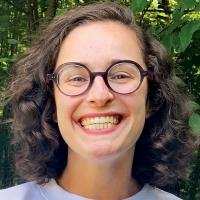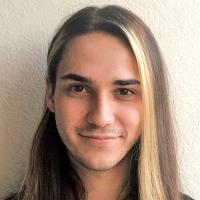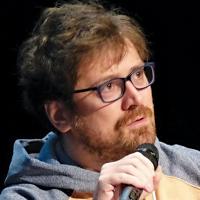
Joanna Masel
Modeling Agency Formally
Universal principles of evolutionary adaptation
Subaward Principal Investigator
University of Arizona
Joanna Masel is a mathematical modeler and data scientist whose researches foundational questions about how evolution works. These include the population genetic basis for evolvability, applications of evolvability theories to the de novo birth of genes from junk DNA, and subsequent directionality in protein evolution. They also include the puzzle of how populations withstand high rates of deleterious mutation, and the search for general principles to organize the enormous variety of adaptations/goals we observe in nature and tension among them. As well as evolutionary biology, she also dabbles in many other fields from biochemistry to education to economics, and most recently, pandemic tech.

Alex McAvoy
Modeling Agency Formally
Natural selection for collective purpose
University of Pennsylvania
I am interested in game theory, population dynamics, and the ways in which game theory can inform our understanding of populations of interacting agents. My work includes mathematical models of genetic and cultural evolution, as well as of reinforcement learning within a population. I am especially interested in theoretical aspects of collective behavior (such as learning) emerging from simple interactions. I have a Ph.D. in mathematics from the University of British Columbia and spent several years in Boston before joining the Center for Mathematical Biology at the University of Pennsylvania as a Simons Postdoctoral Fellow.

Fiona McCann
Modeling Agency Formally
Universal principles of evolutionary adaptation
University of Arizona
Fiona McCann (she/her/hers) is a second year graduate student in the Applied Math PhD program at the University of Arizona. She received her Bachelor's in Science in Applied Math with a secondary major in Psychology from the University of Massachusetts, Amherst. She is interested in new ways that math modeling can affect current research within psychology/psychiatry, biology, and ecology. With past research in modeling bipolar disorder, empathy, and cannibalism, Fiona's current research regards population dynamics via a novel approach for the lottery model.

Matthew McCaskey
Modeling Agency Formally
Universal principles of evolutionary adaptation
University of Arizona
I am a second year applied math PhD student at the University of Arizona, currently working in Dr. Joanna Masel's lab. I am primarily interested in ecology, evolution, and population genetics. My past research includes topics such as protein evolution, and the evolution of multicellularity.

Janet McKernan is the administrator at the Minnesota Center for Philosophy of Science and will be providing administrative support for the project.

Daniel Melamed
Directionality in Genomics and Macroevolution
Mutation rates, variational specificity, and genomic directionality
University of Haifa
Dr. Melamed is the manager of the Livnat lab. He spearheads the design of novel techniques and their application to the study of mutational and recombinational mechanisms in the Livnat lab and helps to supervise research projects on the fundamental nature of mutation. He earned his undergraduate degree in Biology magna cum laude and his Masters in Cell Research and Immunology summa cum laude at Tel Aviv University, studying the effects of mutations on viral assembly and release from cells in the human immunodeficiency virus-1 (HIV-1). He received his Ph.D. at the Israel Institute of Technology, the Technion, studying mRNA translation regulation. Following Ph.D. and prior to joining the Livnat lab, he was a Howard Hughes Medical Institute (HHMI) Fellow at the University of Washington at Seattle in the lab of Stanley Fields, where he honed his expertise on molecular biological methods development with an emphasis on large-scale sequencing and mutagenesis studies.

Maël Montévil
Agency and Directionality in Development, (Re)Conceptualizing Function and Goal-Directedness, Higher-Level Agency and Directionality in Ecology and Earth Science
An organizational account of ecological functions, Intrinsic purposiveness and the shaping of development, Open-ended evolution and organizational closure
Maël Montévil is chargé de recherche in CNRS, in République des savoirs, USR 3608, École Normale Supérieure. He is a theoretical biologist working at the crossroad of experimental biology, mathematics, and philosophy. He developed the framework of constraints closure and theorized biological historicity and its implications for theory and modelization with which to study current issues such as endocrine disruptors and, more generally, anthropocene's disruptions and our response to them. Montévil is the author of more than twenty-five peer-reviewed articles and a monograph with Giuseppe Longo: Perspectives on organisms.

Alvaro Moreno
Evolutionary Origins and Transitions of Agency
Integration and individuation in the origin of agency
Subaward Principal Investigator
Donostia International Physical Center
Alvaro Moreno Bergareche is Emeritus Professor of Philosophy of Science at the University of the Basque Country (UPV/EHU). Born in Donostia-San Sebastián, he is a specialist in the areas of Philosophy of Science & Philosophy of Biology, Artificial Life, Complex Systems and Philosophy of Cognitive Science. Professor Moreno has been the principal investigator in many funded projects (funding institutions include: Spanish Ministry of Education and Science, Basque Government, University of the Basque Country), and participated to several others, including European research networks. He has also participated as Review Expert in the evaluation of proposals submitted to the European Commission for funding and/or review of projects being funded by the Commission). He has organized many international conferences and workshops on the relation between Artificial Life and AI, philosophy of biology and cognitive science, and complex systems at large. He has been member of the organizational and/or program committee of more than 20 international conferences, and he is since many years regular member of the program committee of the Artificial Life conferences (ALIFE) and the European Conferences on Artificial Life (ECAL). He has organized a Doctorate Program on Complex Systems, awarded by the Spanish Ministry of Education, and has supervised many PhD theses, most of them obtaining the highest marks. He is also co-founder of the Spanish Network of Cognitive Sciences (http://retecog.net) and has been actively involved in the dissemination of science, and he led the project for the creation of the Museum of Science in San Sebastian (Spain) (www.miramon.org). His work has received a growing international recognition, which is confirmed by the invitations he regularly receives to give lectures in different countries, and the numerous national and international awards he received.bHe has developed, together with numerous collaborators and students, both local and international, a distinctive interdisciplinary research line on Biological Autonomy, which bridges philosophy and science and has obtained significant international projection. This achievement is reflected in the creation of the IAS–Research Centre for Life, Mind & Society (http://www.ias-research.net), which has become a reference in Europe in its domain.
